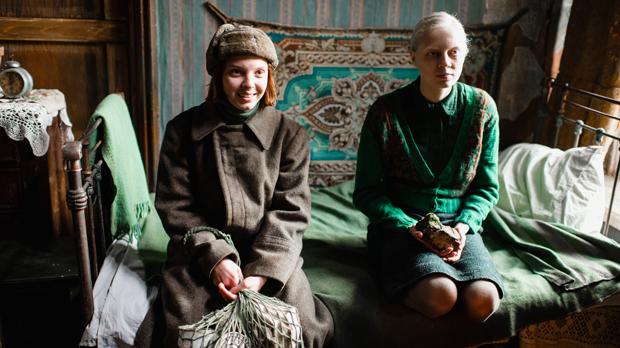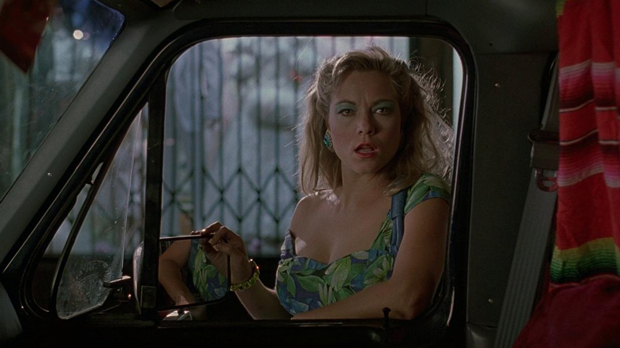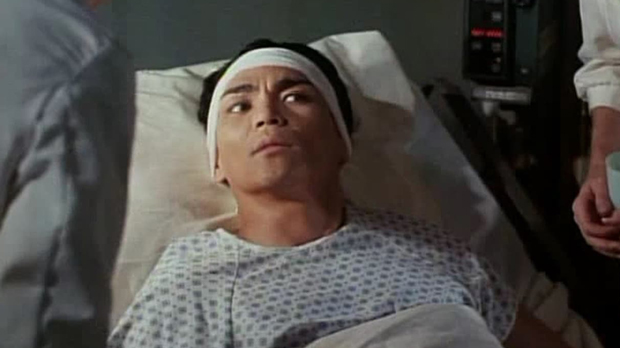 Beanpole (2019) Kino Lorber/Drama RT: 137 minutes No MPAA rating (graphic nudity, sexual content, violence, thematic elements) Director: Kantemir Balagov Screenplay: Kantemir Balagov and Aleksandr Terekhov Music: Evgueni Galperine Cinematography: Kseniya Sereda Release date: February 21, 2020 (Philadelphia, PA) Cast: Viktoria Miroshnichenko, Vasilisa Perelygina, Andrey Bykov, Igor Shirokov, Konstantin Balakirev, Kseniya Kutepova, Alyona Kuchkova, Timofey Glazkov, Veniamin Kac, Olga Dragunova, Denis Kozinets, Alisa Oleynik. Box Office: $196,258 (US)/$2M (World) Spoken in Russian w/English subtitles
Beanpole (2019) Kino Lorber/Drama RT: 137 minutes No MPAA rating (graphic nudity, sexual content, violence, thematic elements) Director: Kantemir Balagov Screenplay: Kantemir Balagov and Aleksandr Terekhov Music: Evgueni Galperine Cinematography: Kseniya Sereda Release date: February 21, 2020 (Philadelphia, PA) Cast: Viktoria Miroshnichenko, Vasilisa Perelygina, Andrey Bykov, Igor Shirokov, Konstantin Balakirev, Kseniya Kutepova, Alyona Kuchkova, Timofey Glazkov, Veniamin Kac, Olga Dragunova, Denis Kozinets, Alisa Oleynik. Box Office: $196,258 (US)/$2M (World) Spoken in Russian w/English subtitles
Rating: ***
You may want to bring your antidepressants with you if you opt to see Beanpole, an unrelentingly depressing Russian import centering on two damaged women in post-war Leningrad. To be honest, I was dreading watching it. This time of year, the mainstream movies are bleak enough. After enduring the likes of Underwater, Dolittle and Fantasy Island, I wasn’t sure I wanted to deal with a movie about life in a war-ravaged, poverty-ridden Communist country regardless of it being a quality film (unlike the other titles I mentioned). In fact, it was Russia’s entry for this past year’s Academy Awards. Well, I’m not going to NOT watch it; surely you know me better than that.
I’m going to tell you from the start that the two main characters in Beanpole, Iya (Miroshnichenko) and Masha (Perelygina), suffer from what we now know to be PTSD. It’s the reason behind their behavior and actions throughout the sophomore effort of Kantemir Balagov (Closeness), a 28YO filmmaker uncommonly fluent in the language of cinema. Iya, nicknamed Beanpole due to her height, has a post-concussive disorder which makes her prone to sudden fits of freezing in place, unable to move or speak until the episode has passed. She acts as mother to Pashka (Glazkov), the 3YO son of fellow soldier and best friend Masha. During one of her fits, she accidentally smothers the boy. When Masha comes home and finds out what happened- in a protracted, near-unbearable scene- she doesn’t get all emotional. Instead, she compels Iya to conceive and bear another child for her as she can’t have children anymore. She additionally blackmails a doctor (Bykov) at the hospital where they both work into being the surrogate father.
It also bears mentioning that Masha becomes romantically involved with Sasha (Shirokov), a horny rich kid and son of a government official best described as a “lap dog”. He’s the type that confuses love with servitude. He’s nice but otherwise useless like all the men in Beanpole. Forgive me for jumping ahead a bit, but the central idea of Balagov’s film is one of female empowerment, the notion that the two protagonists don’t need men to define their being. It’s a good message, but the journey to it is a rough one.
A significant amount of Beanpole is tough to take. Take the scene where the doctor tries to impregnate Iya. She insists on Masha being present during the act leading to a harrowing scene of Masha being pinned between the wall and the copulating couple. This “threesome” isn’t any man’s fantasy. Then there’s the scene I mentioned earlier between Iya and Masha. In it, Iya can’t bring herself to speak the truth about what happened to her friend’s child. Without uttering a single word, Iya manages to communicate the horrific truth to Masha. It’s a long scene, about five minutes, and it’s a hard five minutes. It’s also a fine example of cinema done right. Everything in this scene- the lighting, the acting, body position- is perfectly calibrated. It still gives me chills when I think of it.
Balagov also makes excellent use of color especially green which he uses to represent the creation of new life. Look at the carefree way Masha spins and twirls when she tries on a green dress made by a neighbor. It’s obviously representative of her desire to have a baby even though she’s sterile as a result of her duties during the war. Red- as in the nosebleeds Masha frequently gets- acts as a symbol of the trauma caused by the women’s experiences in the war. This is the work of Kseniya Sereda whose brilliant cinematography allows the story to be told visually more so than through dialogue. The silences say far more than words ever could. The production design by Sergey Ivanov and Evgueni Galperine’s haunting score complete the ensemble. Setting the action in wintertime makes it all the more cold and bleak.
This is the first time Miroshnichenko and Perelygina have acted and they are both wonderful. In fact, I’d even say their performances are flawless. They are 100% natural. It’s no easy feat to act with one’s eyes and facial expressions yet both of them pull it off perfectly. Miroshnichenko’s height and lanky frame enable her to loom over the proceedings like a specter while Perelygina’s red hair conveys the fire in her soul and her calculating nature. Beanpole is a movie where acting is of paramount importance. You have to have legitimate talent to successfully pull off either lead role. These two ladies have it.
I was going to say that Beanpole runs too long but after taking time to think about it, I’m going to say that its slow pace is ideal. This is a movie about character NOT action. The story is driven by how the ladies react to situations and circumstances, an especially precarious thing given their PTSD. That is where the tension truly lies. Still, Beanpole can be a bit much emotionally. If you think you can handle it, go for it. Just be sure to refill your Zoloft beforehand.




